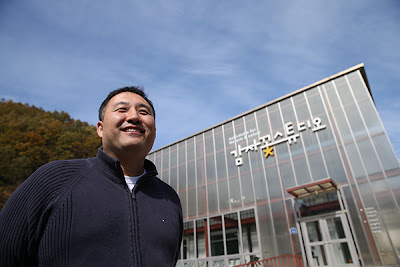"It has been 10 years since I moved here. I was awarded by the Town Office and County Office this spring and autumn for my work throughout those years. More over, I received it as an award for my contribution to regional development. The thought of culture as the power of regional development and the help for our town makes me very proud." said by Lee Sun-chul, founder of the Potato Blossom Studio Center. Although he received many honors as minister, it is a little bit different to be awarded as a resident in the county.
The Potato Blossom Studio Center is a center for cultural activities transformed by an old school. It has emerged as the premier place in the region where locals can enjoy playing samulnori, traditional Korean percussion music, and watch performances by local and national celebrities. Some famous singers also made their shows there and companies have visited the site to learn from the community and replicate the project.
“Before the school was closed in 1999, it was the elementary school every resident here went to. If I carried on other project in this place, people would have felt a sense of loss. At first locals were very curious and wary about what I was going to do with the school and afraid the young man would do something bad." the cultural director says.
As a native Seoulite, this deteriorating physical condition made him decided to move to the countryside in Gangwon in 2002. “It’s not something I am proud of saying - my weight once reached around 110 kilograms [242 pounds] from drinking and eating too much meat. I got cerebral infarction when singer Lee Seung-hwan was on a nationwide show." Lee worked as a planning director for the Kim Duk-soo Samulnori Team for 10 years, and also directed concerts for renowned vocalist Lee Seung-hwan and a rock group Jawoorim. Precociously he changed his life style due to his ill health. “During my first year here, I lost over 30 kilograms thanks to a vegetarian diet and hiking.”
The change of his body does not change his passion of cultural events. He earned funds from the Ministry of Culture, Sports and Tourism to buy musical instruments and invite musical lecturers to teach elementary school and middle school students about Korean traditional music. He even formed a band called the Daeil Band composed of high school students. “I did not expect to teach the music to high school students as they are busy studying for college, but we got support from teachers. The active musical experience among students prompted adult residents to participate in musical activities, too."
Local government responded the project. The Pyeongchang County Office purchased an abandoned school and granted Lee the rights to renovate the building in 2004. The 46-year-old asked Prof. Lee Jong-ho of the Korean National University of Arts to help with the project. "Even it is a countryside, I want to make it more fashionable. But I remain the spirit of the town as school instead."
Changing the old space into culture center is also the subject of his thesis written in his studying days in England. With the major of arts management, he becomes a professsor in Yong In University. He now carry on the project base on his experience in traditional markets in Gangneung and Chuncheon. "It did not started with a good chance. To me, it is a desperate attempt. But looking back on these days, I found that everything started with a reason. To those who plan to return to the countryside, I recommend they bring with them the expertise they have to make contributions to local communities."
Original article:
Intermediate English Composition class #3
International Trade 201299002
Hyoseok Song 송효석



That's a great idea. I'd like to see more of these kinds of grassroots projects. It is great for the community.
ReplyDelete